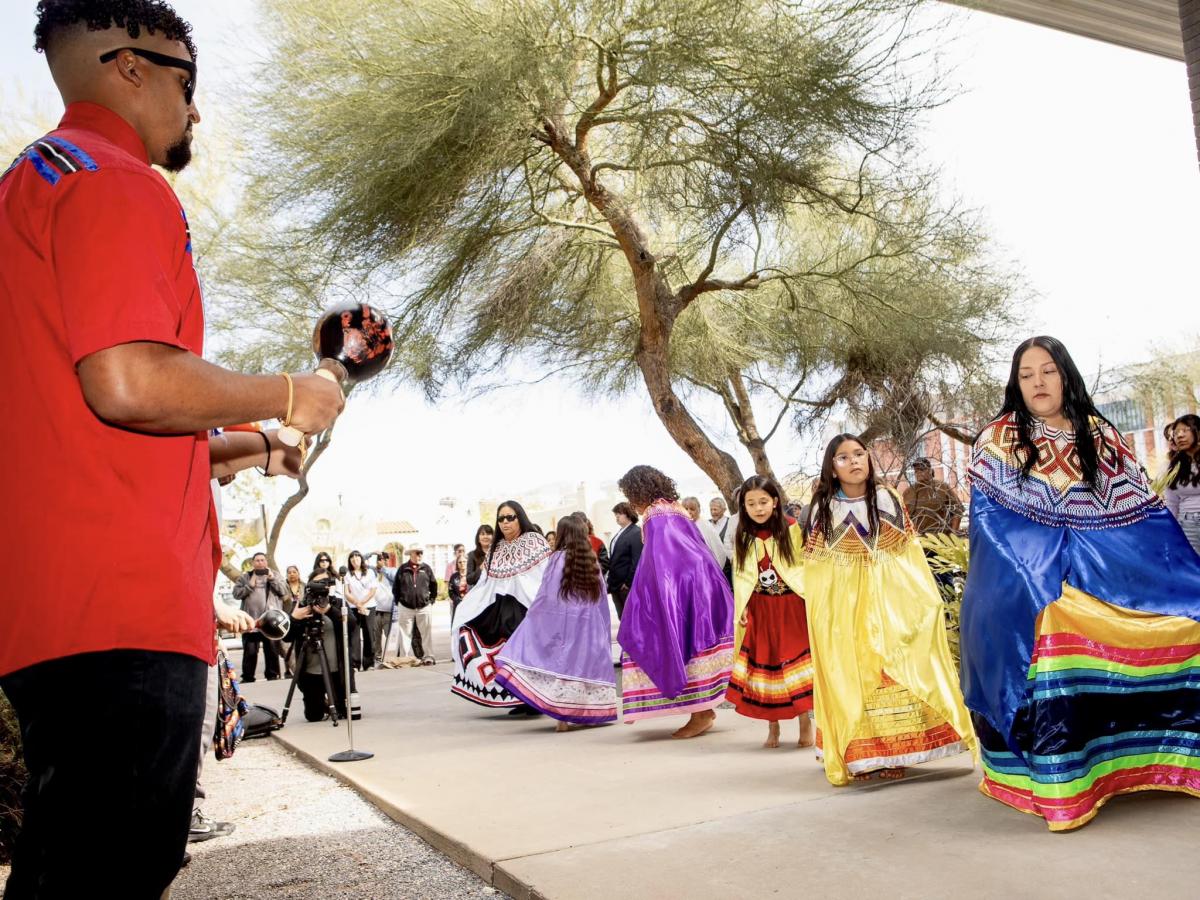Shanyíitsq a’ íim aatsuu’ ávk,
“In the Silence We Listen”
A Quechan (Kwatsáan) translation focusing on the act and experience of sharing poetry now graces the Poetry Center’s building sign.
The inscription—Shanyíitsq a’ íim aatsuu’ ávk, “In the Silence We Listen”—was dedicated at a ceremony March 11, featuring remarks from University and Tribal leadership, including a reading from Deborah Jackson Taffa, a member of the Quechan Indian Tribe and author of the memoir Whiskey Tender.

“Language is one way the human imagination becomes tangible. At the Poetry Center, we’re thrilled to celebrate the many languages of Arizona, and in particular, the Kwatsáan language, through this new partnership. In a building dedicated to language housing more than 7 million poems, we think of the Poetry Center as a place where our imaginations can roam free, and can be emboldened to face the challenges and opportunities of the future,” said Poetry Center Executive Director Tyler Meier.
“We thank the university for memorializing our people and the Kwatsáan language. May we hold to the spirit of respect for each other’s stories and may we recognize that they are all American stories. May we remember that healthy societies need narratives and counter-narratives if we are to exist side by side in peace,” said Taffa, Director of the MFA program in Creative Writing at the Institute of American Indian Arts.

"may this sign stand as a reminder of the diverse voices
that contribute to the mosaic of Arizona’s native nations.”
“I can’t imagine a better setting than the Poetry Center for the sign project. It’s the perfect location for this theme of ‘In Silence We Listen.’ We’re grateful for the partnership we have with all the 22 nations and I’d like to thank the Fort Yuma-Quechan tribe, who chose this particular project,” said University President Robert C. Robbins.
“This project at the university aligns very well with the COH mission and values. Our college is deeply committed and invested in languages and language work, how our cultures and heritages are held in languages. When we study languages, we are studying what connects us and keeps us in relationship with one another. There is no better place for this partnership than the Poetry Center, which is an essential space on campus devoted to profound and moving experiences with languages,” said Alain-Philippe Durand, Dorrance Dean of the College of Humanities.
The dedication is part of the University of Arizona’s Native Languages of Arizona Campus Sign Initiative. A collaboration of the University’s Linguistics Department and the Office of Native American Advancement and Tribal Engagement, the initiative is part of broader efforts to make the University a welcoming and inclusive place for Native American students, faculty, staff, and visitors, and to honor the Native Nations in Arizona.

“As we unveil this sign adorned with the beauty of our ancestral language, we pay homage to the poetic essence of our heritage. Our native languages are not merely words, they are vessels of our stories, traditions and sacred connections to the land,” said Quechan Tribal Council Member Jonathan Koteen. “May the poetry that flows through these walls be enriched by the echoes of our native tongue and may this sign stand as a reminder of the diverse voices that contribute to the mosaic of Arizona’s native nations.”
The Poetry Center is the fourth campus building to be dedicated, following the Communications Building, Old Main and Arizona Stadium.
“We are very happy that the signage is now becoming permanent. It’s great to have that visibility for all the languages of Arizona and the Southwest,” said Ofelia Zepeda, Regents Professor of Linguistics and Director of the American Indian Language Development Institute, which started the initiative.
Home of the Quechan (Kwatsáan) Indians, Fort Yuma-Quechan Reservation is located along both sides of the Colorado River near Yuma.
In 2004, then UA president Peter A. Likins announced that the Poetry Center’s new home would be named for Tucson arts advocate and chair of the Poetry Center’s Development Committee, Helen S. Schaefer, who passed away in 2022.

